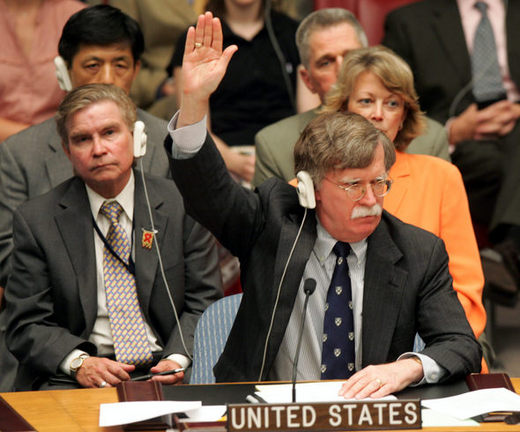 |
|
The U.S. ambassador to U.N. John Bolton uses his veto to block the resolution against Isreal's attack on Gaza at the U.N. security council on July 13. Newyork (Ap Yonhap News)
|
With Japan easing position, council expected to reach common ground
The U.N. Security Council discussed two draft resolutions against North Korea for 11 hours on July 13, failing to adopt either one. The first was proposed by China and Russia, the other by Japan and the United States. But with Japan, which had previously assumed a tough attitude against the communist nation, easing its position, the council plans to adopt a unified resolution as early as this weekend. The security council’s lengthy discussion, with the five permanent members--the U.S., England, France, China, and Russia in attendance, included a presentation by Kenzo Oshima, Japanese ambassador to the U.N. According to diplomatic sources in the U.N., they discussed the Japan-proposed resolution containing tough sanctions against the North, as well as a China-proposed resolution criticizing the North Korean missile tests but not containing forcible sanctions. Japan indicated that it would accept the framework of a draft proposed by the two allies of North Korea, China and Russia, in order to adopt a final resolution, Japanese media said. After the meeting, John Bolton, the U.S. ambassador to the United Nations, said that though there is a long way to go, there are parts of the drafts acceptable to all members of the council. Ambassador Kenzo remarked that the G-8 summit is around the corner. We want to complete the negotiation by the weekend.Japan’s largest newspaper, Yomiuri Shimbun, reported that the U.S. and Japan have decided to submit a revised draft on the afternoon of July 14 and then push for a vote on it. Yomiuri said, quoting a diplomatic source, that the revised draft is expected to remove mention of Chapter VII of the U.N. Charter, which China and Russia have demanded, and to tone down wording that the North’s missile launches. Beijing and Moscow also prefer adopting a resolution quickly, but they are opposed to setting a time limit on the discussions. Therefore, debate on the wording of the resolution may continue into next week. China’s U.N. ambassador Wang Guangya said, “There could be better understanding of each other’s position. We have a ‘red line’.” The red line refers to China’s clear stance that it does not want the resolution to contain references to Chapter VII, which serves as the basis for economic sanctions and military action. Seoul also implicitly criticized the use of any wording from Chapter VII of the U.N. Charter. An official of Ministry of Foreign Affairs and Trade said, “The South Korean government supports a united voice within the U.N. Security Council”. To quote Chapter VII may create difficulties for it to reach a harmony of view and may bear a negative effect on the situation in Northeast Asia.






